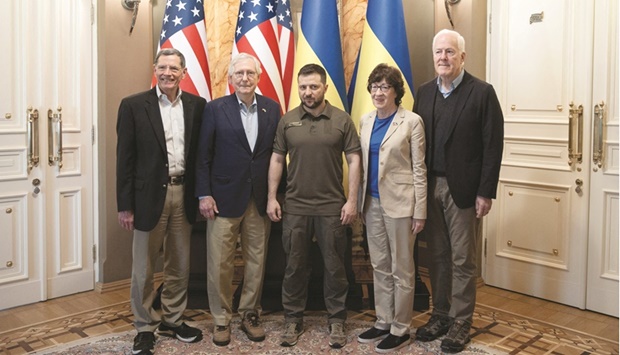• Finnish leader tells Putin his country plans to join Nato
• G7 nations vow more military, economic aid for Ukraine
Ukrainian forces have launched a counter offensive near the Russian-held town of Izium in eastern Ukraine, a regional governor said yesterday, in what could prove a serious setback for Moscow’s plans to capture the entire Donbas region.
Russian forces have focused much of their firepower on the Donbas in a “second phase” of their invasion that was announced on April 19, after they failed to reach the capital Kyiv from the north in the early weeks of the war.
But Ukraine has been retaking territory in its northeast, driving the Russians away from the second-largest Ukrainian city of Kharkiv. Keeping up pressure on Izium and Russian supply lines will make it harder for Moscow to encircle battle-hardened Ukrainian troops on the eastern front in the Donbas.
Ukrainian President Volodymyr Zelenskiy also said complex talks were underway to find a way to evacuate a large number of wounded soldiers from a besieged steel works in the port of Mariupol in return for the release of Russian prisoners of war.
Mariupol, which has suffered the heaviest fighting in nearly three months of war, is now in Russian hands but hundreds of Ukrainian fighters are still holding out at the Azovstal steel works despite weeks of heavy Russian bombardment.
The Group of Seven leading Western economies pledged in a statement yesterday to “further increase economic and political pressure on Russia” and to supply more weapons to Ukraine.
Commenting on the latest developments in eastern Ukraine, regional governor Oleh Sinegubov said in comments aired on social media: “The hottest spot remains the Izium direction.”
“Our armed forces have switched to a counteroffensive there. The enemy is retreating on some fronts and this is the result of the character of our armed forces,” he said.
The war has prompted Finland to abandon its military neutrality and seek membership of Nato (North Atlantic Treaty Organisation). Sweden is widely expected to follow suit.
Finnish President Sauli Niinisto told Putin by phone that his country, which shares a 1,300km border with Russia, wanted to join Nato to bolster its own security.
Putin told Niinisto it would be a mistake for Helsinki to abandon its neutrality, the Kremlin said, adding that the move could harm bilateral relations.
Turkish President Tayyip Erdogan said on Friday it was not possible for his country, a Nato member, to support enlarging the alliance because Finland and Sweden were “home to many terrorist organisations”.
The foreign ministers of Finland and Turkey were due to meet in Berlin later yesterday to try to resolve their differences over Nato accession.
Erdogan’s spokesman, Ibrahim Kalin, said yesterday that Turkey had not shut the door to Sweden and Finland joining but wants negotiations with both countries and a clampdown on what it sees as terrorist activities in Europe.
Kalin said the Kurdistan Workers Party (PKK) — designated a terrorist organisation by Turkey, the United States and the European Union — was fundraising and recruiting in Europe and its presence was “strong and open” in Sweden in particular.
“What needs to be done is clear: they have to stop allowing PKK outlets, activities, organisations, individuals and other types of presence to ... exist in those countries,” Kalin said.
One of the aims of Russia’s action in Ukraine was to prevent the former Soviet republic ever joining Nato.
German Chancellor Olaf Scholz, who spoke to Putin by phone on Friday, said he detected no sign of any change in the Russian leader’s thinking on the conflict.
In an interview for the t-online news website published yesterday, Scholz said Western sanctions on Russia would remain in place until it reached an agreement with Ukraine, adding: “Our aim is for this invasion to fail.”
Meeting in Germany, foreign ministers from the G7 group of rich nations backed giving Ukraine more aid and arms.

Ukraine’s President Volodymyr Zelenskiy poses for a picture with US Senate Minority Leader Mitch McConnell (R-KY), Senator Susan Collins (R-ME), Senator John Barrasso (R-WY) and Senator John Cornyn (R-TX) before a meeting in Kyiv yesterday. (Reuters)
